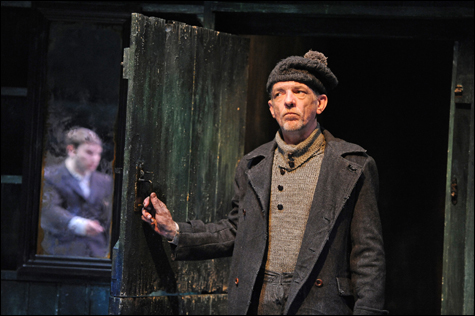
CELTIC DITTY McDonagh’s portrayal of Aran Island life in 1934 is heartstabbing, hilarious, and often as deadpan as Beckett. |
Although Martin McDonagh’s The Cripple of Inishmaan is the least likely of his plays to provoke a riot, as John Millington Synge’s The Playboy of the Western World did at its 1907 Dublin premiere, it is the most Synge-like of the Anglo-Irish dramatist’s works. There is none of the torture and bloody body dismemberment with which the audacious author nudged his Irish Gothic closer to Gaelic Guignol. (Despite a few human dust-ups, one of them unflinchingly brutal, the majority of the play’s violence is done to eggs.) But in addition to including an apparent resurrection, as Playboy does, Cripple ameliorates its corrosive portrayal of life in the bleak West of Ireland with compassion. And it’s hard to imagine a production that could better harmonize the dark comedy’s mean-spiritedness and poignancy, or sings its profanely melodic song, than Garry Hynes’s for Galway’s Druid Theatre (presented by ArtsEmerson on the Paramount Mainstage through February 6).
It was Hynes and the Druid who discovered the then-26-year-old McDonagh, premiering The Beauty Queen of Leenane in 1996. Cripple, the best of a trilogy set on the Aran Islands, debuted at Britain’s National Theatre later that same year. Set in 1934 on the middle island of Inishmaan, the play is spurred by the filming on nearby Inishmore of the Robert Flaherty pseudo-documentary Man of Aran. Among those desperate to escape a life at once merciless and numbing by getting into the film is Cripple Billy, a lame 17-year-old orphan in the charge of two “pretend aunties” who run a shop that sells mostly peas. Treated with casual cruelty by a scant populace that regards him as “mangled and fecked,” Billy hatches a scheme to get himself to Inishmore, where, improbably, his dream of escape comes temporarily true.
But if Billy hopes to flee his environs, the audience will be hard pressed to get enough of their harsh, colorful denizens. These include, in addition to the aunts (one of whom talks to a stone), town gossip JohnnyPateenMike, whose “biteens” of news would “bore the head off a dead bee,” the 90-year-old Mammy whom JohnnyPateen has been trying for decades to off with drink, and taciturn bruiser boatman BabbyBobby, with whom it proves unwise to mess. Among Billy’s contemporaries are the chronically pugilistic Slippy Helen, after whose favors Billy hankers, and her brother Bartley, who’s obsessed with American sweets and telescopes. What McDonagh breeds among these folk pits ruthless Irish stereotype in the tradition of Synge against the sentimental clichés perpetrated by American film; it’s also heartstabbing, hilarious, and often as deadpan as Beckett. (A sequence in which Bartley tries to select a candy, though played by Laurence Kinlan and the wonderful Dearbhla Molloy like a tennis game between earnestness and resignation, is pure vaudeville.)
McDonagh, who spent childhood summers in the West of Ireland, wields language that’s crude, colloquial, and as musical as a Celtic ditty. And you will probably never hear it as authentically spoken as by this company from Galway (though, given the accents, careful listening is required). Hynes’s production flies like a bird over the murky territory of black-Irish cartoon, at its center the painfully broken Billy of Tadhg Murphy. Ventured amid raillery about poteen, pet murder, and Billy’s parents’ suicide, his every journey across the wide stage, bad arm hanging and misshapen foot dragging, is a sad feat of physical fortitude.